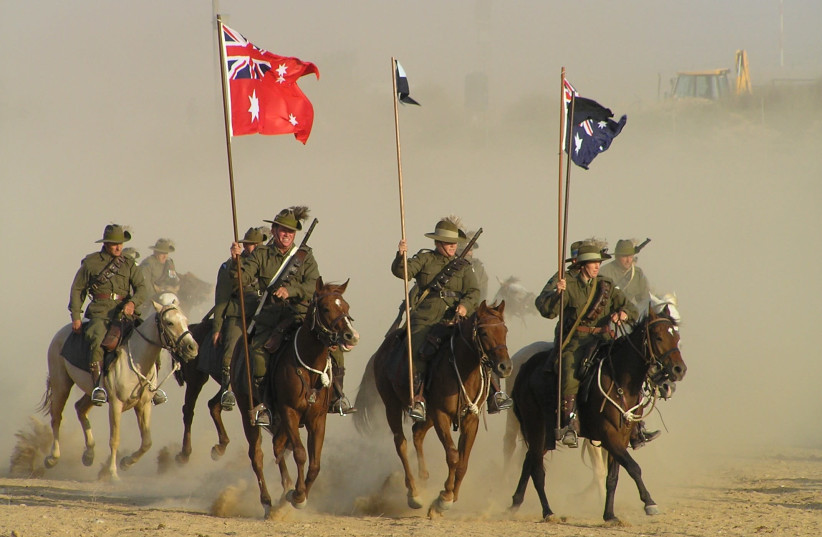Building on these foundations, today’s Israel-Australia partnership encompasses robust economic ties, as well as cooperation in vital matters of national security. Now it’s in danger.

Australia and Israel share a historic friendship and much contemporaneous mutually beneficial cooperation. However, as I heard last month at a think tank dialogue in Canberra, there are potential storm clouds on the horizon that threaten to seriously disrupt ties.
The Israel-Australia relationship has its roots in World War I. The 1915 Gallipoli Campaign was a formative experience for both Australia and the Zionist movement. The 60,000 Australians who took part in that failed attempt to knock Ottoman Turkey out of the war were joined by the 737-strong Zion Mule Corps, the first independent Jewish military formation since antiquity.
In the Palestine Campaign (1917-18), the ANZACs fought alongside the five-battalion Jewish Legion. The allied advance, which included the charge of the Australian Light Horse at Beersheba on 31 October 1917 – history’s last great successful cavalry charge – was supplied with crucial battlefield intelligence by the Zionist espionage ring NILI, which operated behind Ottoman lines.
This wartime interaction influenced twentieth century Australian speech. The word “cobber” – a ubiquitous colloquialism for “friend” – is said to have stemmed from the bastardization of the Hebrew word “chaver” of the same meaning.
Thirty years after the Palestine Campaign, the United Nations was debating partition. At that critical time, Australia’s UN representative H.V. Evatt lent the Jews invaluable support. Evatt, a future leader of the Australian Labor Party, chaired the important Ad Hoc Committee on Palestine in the lead up to the General Assembly’s historic vote of 29 November 1947 in favor of Jewish statehood. This backing necessitated breaking with mother country, Britain – a demonstration of Australia’s newly independent standing in the world.

Building on these foundations, today’s Israel-Australia partnership encompasses robust economic ties, as well as cooperation in vital matters of national security – with Australia’s vibrant Jewish community actively promoting the relationship.
The issues facing Israel-Australia ties
Yet, over the years, there have been several bumps in the road, most recently on the sensitive issue of Jerusalem.
In October 2018, Liberal Party prime minister Scott Morrison, facing a by-election in the heavily Jewish Sydney electorate of Wentworth, indicated that Australia would follow the United States in recognizing Jerusalem as Israel’s capital, and similarly move its embassy to Jerusalem.
This pronouncement did not win the by-election for the Liberals, but it did ignite opposition from Muslim-majority neighbors Indonesia and Malaysia, as well as from domestic champions of the Palestinian cause.
Australia’s embassy was never moved, but the Liberal government did designate west Jerusalem as Israel’s capital. The opposition Labor Party condemned the decision and pledged to annul it if returned to office.
In the May 2022 elections, Labor was indeed victorious, with party leader Anthony Albanese replacing Morrison as prime minister. Those concerned about the relationship were reassured by the new government that Australia’s friendship with Israel would remain unchanged.
Then, in October, Canberra announced that Australia no longer recognizes west Jerusalem as Israel’s capital, reversing the previous government’s decision. Labor had its own electoral considerations, but Foreign Minister Penny Wong emphasized the policy: Jerusalem’s status should be determined in negotiations between Israelis and Palestinians.
Of late, such talks have been non-existent, but the Palestinian Authority, as in the Arab Peace Initiative (2002), demands a Palestinian capital in East Jerusalem and a state on the 4 June 1967 lines. West Jerusalem, the seat of Israel’s government, parliament, and supreme court, is clearly on the Israeli side of those frontiers.
FURTHERMORE, LABOR’S hopes for a two-state solution are based on a series of final status peace plans – the Beilin-Abu Mazen Agreement (1995), the Clinton Parameters (2001), and the Geneva Initiative (2003) – all of which recognize West Jerusalem as Israel’s capital.
Accordingly, to pro-actively assert that west Jerusalem is not Israel’s capital is to give succor to extremists who deny the Jewish state’s right to exist in any borders. Unsurprisingly, Hamas, designated a terrorist organization by Australia, praised Canberra’s retraction.
Outgoing Israeli prime minister, Yair Lapid responded to Australia’s reversal, stating that “Jerusalem is the eternal and united capital of Israel and nothing can ever change that.” He also added, “we can only hope that the Australian government manages other matters more seriously.”
Nonetheless, the real challenge to Israel-Australia ties may still lie ahead. Institutions of the Labor Party have adopted resolutions favoring recognition of the PLO’s self-declared State of Palestine. Party decisions do not necessarily bind the government, but ministers are not ruling it out.
Proponents of such a step claim it will advance peace. However, divorcing Palestinian statehood from a negotiated solution will accomplish the exact opposite. If the Palestinians can receive international recognition for a state without engaging with Israel or moderating their positions, it severely curtails their motivation for ever doing so.
Moreover, the proposal is to bequeath such recognition unconditionally, regardless of ongoing harmful Palestinian behavior – which includes the provision of financial incentives to terrorists who butcher Israeli civilians, as well as the ubiquitous incitement to violence and propagation of anti-Jewish hate speech.
While the specifics of the Israeli-Palestinian dispute may be peripheral to Australia’s national security, for Israel, core interests are at stake.
So far, the only Western country to recognize a State of Palestine was Sweden in 2014, and that led to a downgrading of Jerusalem-Stockholm ties that lasted for eight years. During this period, Sweden’s influence with Israel plummeted, as did its ability to support the Palestinians.
In February 2022, Jeremy Corbyn, the former UK Labour leader, reiterated his call for “the immediate and unconditional recognition of the State of Palestine.” Of course, for Corbyn, a rupture in Britain-Israel ties is a desired policy goal.
Recognition is also advocated by Sinn Féin’s Mary Lou McDonald who, according to opinion polls, could be Ireland’s next prime minister. Sinn Féin is a radical nationalist movement, but on McDonald’s twitter handle there is no Irish flag, only a Palestinian one.
Albanese is not Corbyn, and Australia is not Ireland. But precisely because of Australia’s international standing, if such recognition is forthcoming, Israel would be forced to react strongly to deter others from following suit. A crisis in ties is in the making.
The paradox is that Canberra justified its decision to renege on Jerusalem, by stressing its realignment with a consensus international position. But in recognizing a State of Palestine, Australia would no longer be in line with the EU, UK, US, Canada, and Japan, but standing with Russia, China, and Iran. Is that really where Australia wants to be?
As reported by The Jerusalem Post
